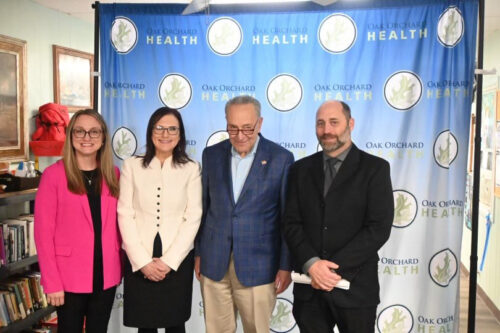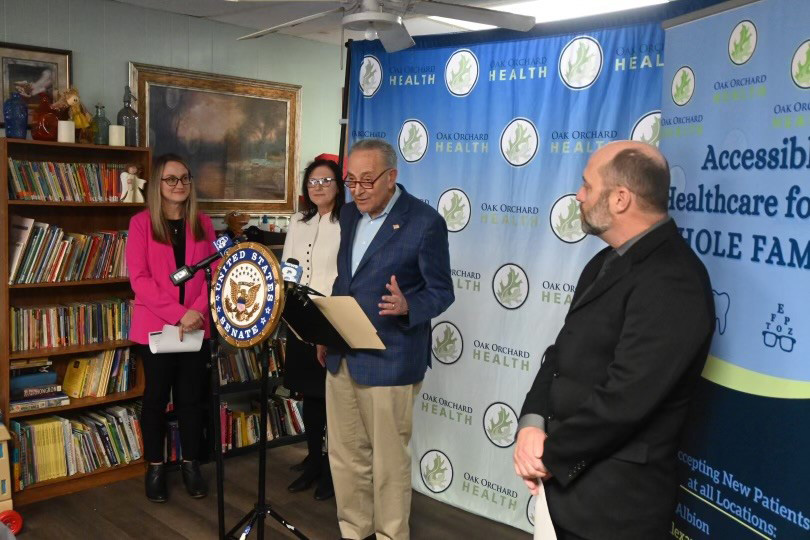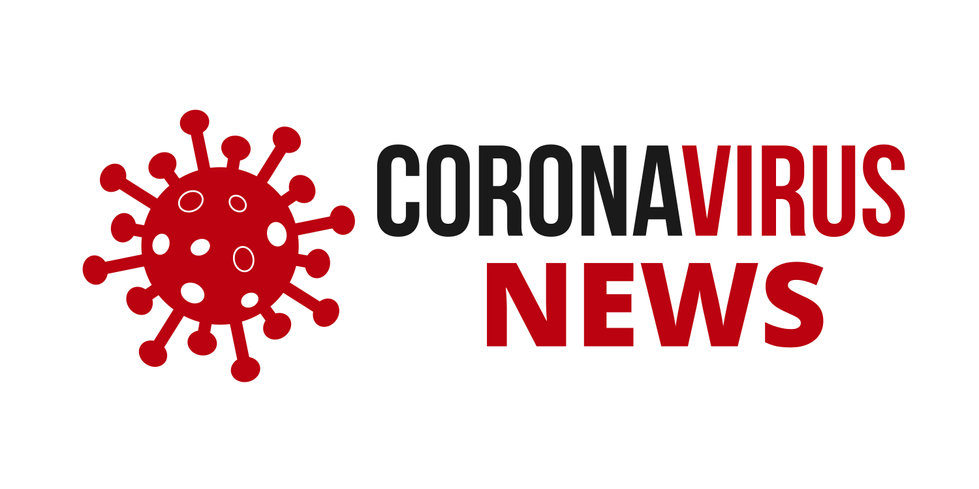Schumer visits Holley in push to save Medicare’s telehealth program

Standing at Community Action of Orleans & Genesee’s Eastern Orleans Community and Senior Center in Holley on November 27, U.S. Senate Majority Leader Chuck Schumer launched his push to protect Medicare’s telehealth program, which could expire at the end of December without Congressional action.
Schumer said it is critical we avoid the upcoming telehealth cliff for Rochester-Finger Lakes seniors, which is especially important to rural areas like Orleans County, to maintain this vital lifeline for accessible healthcare.

“Telehealth services are essential in places like Orleans County; it is a lifeline for our rural areas and seniors who can’t easily travel to the doctor to get the healthcare they need and we can’t let it expire.
That’s why I’m launching a push to avoid the telehealth cliff and save this lifeline for tens of thousands of seniors in the Rochester-Finger Lakes region,” said Senator Schumer. “We saw telehealth surge in use during the pandemic, and we should make sure that access to your doctor is as easy as picking up your phone. I was proud to help Medicare expand telehealth services during the pandemic, but we need to act quickly to preserve this program and ensure this lifeline isn’t cut off for our seniors come 2025.”
“Whether you are in Rochester or Holley, telehealth helps improve accessibility, affordability and makes our health system stronger by reducing wait times and making sure patients can get the care they need, and we have seen that right here in Holley. It makes it so patients can receive timely care, even when they can’t physically make it to the doctor’s office,” added Schumer.
Schumer explained that during the pandemic, the federal government declared a public health emergency that gave the Centers for Medicare & Medicaid Services (CMS) flexibility to reimburse patients for expenses related to telehealth services and allowed providers to deliver audio-only health care services.
Schumer added, “This helped thousands of seniors in rural areas across Upstate NY when the closest doctor is hours away access critical health care services. Telehealth is one of the biggest tools for supporting rural Upstate communities that face shortages of doctors. Especially for seniors who can have difficulty going to a doctor’s office due to mobility challenges, telehealth lets people get routine care without having to worry about how to get to the doctor’s office.”
When the public health emergency officially ended last year, Schumer led efforts to pass legislation to extend those flexibilities that allowed CMS to cover telehealth appointments. However, that legislative authority will expire on December 31, 2024 without Congressional action. This means that seniors could lose coverage for telehealth appointments, doctors could no longer provide audio-only telehealth services, and fewer providers will be able to receive reimbursement for telehealth services.
Schumer is now pushing to include an extension in the end of year legislation and try to make telehealth services a permanent and accessible option for all on Medicare.
Marc Shurtz, CEO of Orleans Community Health said, “Healthcare access in rural areas is often fraught with obstacles. Long travel distances, a shortage of specialists, limited medical resources, and transportation challenges make it difficult for our patients to receive timely, consistent care. For seniors, these challenges can be even more daunting. Telehealth removes many of the barriers that make traditional healthcare services so difficult to access in rural areas. As we face the Medicare cliff we know that the financial strain it could place on healthcare providers could result in fewer services for our seniors. Telehealth allows us to continue delivering quality care in a more cost-effective way, reducing the need for emergency room visits or hospitalizations, and helping keep patients engaged in their health management, particularly for those with chronic conditions.”
“Telehealth has been crucial in removing barriers to healthcare access, making it easier for patients to receive care without worrying about mobility or transportation. It also improves availability, saves time, and helps the system deliver preventative care before problems require hospitalization,” said Richard “Chip” Davis, PhD, CEO of Rochester Regional Health. “Maintaining Medicare reimbursement for telehealth is key to keeping this care affordable and accessible for patients statewide. I’m thankful to Senator Schumer for supporting this important issue and advocating for our most vulnerable populations.”
In addition to the telehealth cliff, Schumer is also pushing to extend community health center funding which is also otherwise set to expire at the end of this year and is vital to support the nation’s Federally Qualified Health Centers including Oak Orchard Health which operates a major clinic in Orleans County as well as provides telehealth services.
“Senator Schumer’s commitment to reauthorizing community health center funding for 2025 is vital for us to continue delivering high-quality services to over 30,000 patients across five counties in Western New York. Without the $4 million in grant support, we would be forced to reduce services in an already underserved area, as designated by the U.S. Department of Health and Human Services. This would have a devastating impact on these communities and the 32 million patients served by health centers nationwide. Reducing Medicare coverage for telehealth services is particularly concerning in rural areas, where patients may need to travel over forty miles to see a doctor or specialist. All essential services are at risk,” said Dr. Danielle Renodin-Mead, Chief Medical Officer of Oak Orchard Health.
Schumer said that it is important for Congress to extend these flexibilities for the approximately 227,602 seniors across the Rochester-Finger Lakes region with Medicare who will lose access to telehealth services. A county-by-county breakdown can be found below:
County – Genesee, Seniors on Medicare – 14,219; Livingston 14,911; Monroe 169,605; Ontario 28,867; Orleans 9,770; Seneca 8,242; Wayne 23,756; Wyoming 9,490 and Yates 6,234.
In Orleans County, health care providers use telehealth as part of providing care every day. Since the pandemic, Orleans’ providers have reported that telehealth has now become the norm as a critical part of the way they reach patients to provide the care they need. Orleans County healthcare providers including Orleans Community Health which includes Medina Memorial Hospital and Oak Orchard Health, a Federally Qualified Health Center (FQHC), have said that this tool is especially important given Orleans’ rural nature and some patients’ lack of transportation or inability to drive long distances. Orleans County is a designated Health Provider Shortage Area, and telehealth also helps ensure that more patients can access the specialized medical, dental, and behavioral health services they need.
Beyond Orleans County, patients of the Rochester Finger Lakes Region’s two largest hospital systems, Rochester Regional Health (RRH) and University of Rochester Medical Center (URMC), would also be cut off from this vital lifeline for accessible healthcare. Rochester Regional Health has reported that expansions to telehealth services improved access to routine care and chronic condition management, reduced unnecessary emergency visits, and accommodated patients with diverse needs, including those who may face digital literacy challenges. In the past year, RRH has completed 179,220 telehealth virtual visits, of which 48,609 were covered by Medicare, across 20 counties including 4,228 in Orleans County. URMC reported that their most vulnerable patients had the highest uptake of telemedicine, and showed lower no-show and cancellation appointments, explaining that telemedicine makes medical care more accessible to patients who have previously experienced substantial barriers to care.
“Community Action of Orleans and Genesee is thrilled to welcome Senator Schumer and our healthcare partners to our Holley Community Center to discuss this important issue. As a key provider of health- related social needs, including facilitation of telehealth, we understand how critical telehealth is for vulnerable populations who live in rural areas with very limited transportation. Losing the availability of payer covered telehealth would result in people not receiving much needed care and would deteriorate positive health outcomes,” said Renee Hungerford Executive Director/CEO Community Action of Orleans and Genesee.
Provided information and photo





